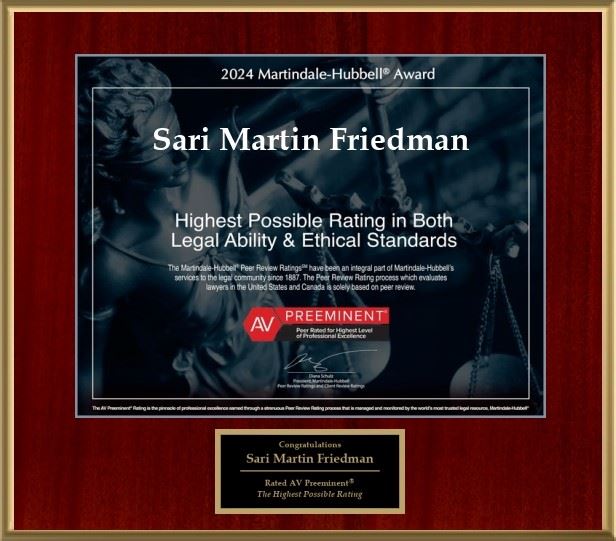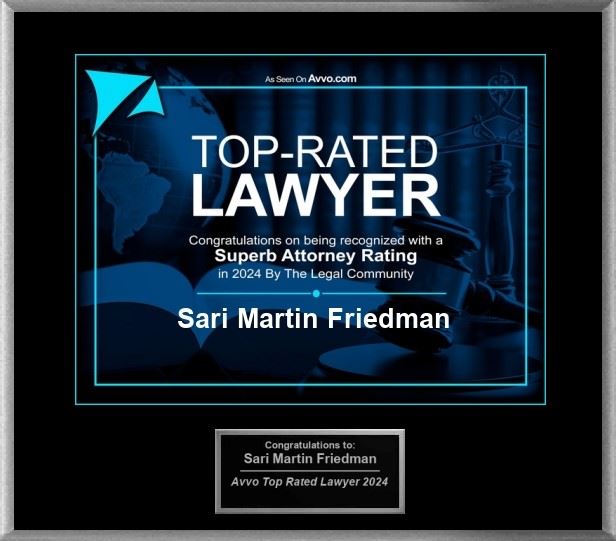Frequently Asked Questions (FAQ)
Common Questions About Divorce in New York
Friedman & Friedman PLLC, Attorneys at Law has more than 90 years of collective experience—and therefore knowledge—in New York family law. Our White Plains divorce attorneys have answers to all kinds of questions our clients have. As a help to you, we have compiled a list of some of the most common questions we receive, together with their basic answers.
Still can't find the information you're looking for? Check out the divorce and family law sections of our site. Ready to talk to a lawyer? Give us a call at (914) 873-4410 or fill out our our online contact form!
NY Divorce Law
- How do I get started with a divorce?
- Where do I go to file for divorce?
- Can I represent myself in divorce?
- Do I need grounds to file for divorce in New York?
- Will I have to go to divorce court?
- How much does a divorce cost? Can I afford a divorce?
- How long will it take to get divorced?
- How is debt divided in divorce?
- If I was married in another state, can I still get divorced in New York?
- Can I get a divorce without my spouse's consent?
- Will my divorce in New York go into public record?
Alternatives to Divorce in New York
Child Custody
- How is child custody decided in New York?
- What are the types of child custody?
- Can a child custody order be modified?
- Can a father get custody?
Child & Spousal Support
- Can I modify the terms of my child support post-divorce?
- I have custody and want to move. Can I relocate with my child?
- How long will I have to pay child support?
- How long will I have to pay spousal support?
Are you facing a family law matter? Call us at (914) 873-4410 to set up your case evaluation!
Q: How do I get started with a divorce?
Your first step in the divorce process should always be to contact a lawyer. The legal process of divorce in New York is very complex and you have too many personal interests involved to make a mistake. Once you have legal counsel, the next step is to decide on what type of divorce you want to pursue (mediated or litigated). You will then need to begin gathering the necessary paperwork, filling out the required forms, and filing them with the clerk at the appropriate family court. The process is very nuanced, so please do not take even the first step toward divorce without the guidance of an experienced family lawyer.
Q: Where do I go to file for divorce?
Where you will go to file for divorce depends on where you and/or your spouse currently reside. If you are filing for divorce in Westchester County, NY, then you will file your divorce at the 9th Judicial District Westchester Family Court in either White Plains, Yonkers, or New Rochelle.
Click here for details about all three Family Law Courts in Westchester County.
 Hours:
Hours:
9AM – 5PM (excluding NY state holidays)
Address:
111 Dr. Martin Luther King Jr. Blvd.
White Plains, NY 10601
Phone:
(914) 824-5500
Q: Can I represent myself in divorce?
Yes. You can represent yourself if you choose to do so, but NYS divorce law is complex and thus it is recommended that you hire professional representation. The outcome of your divorce or separation will greatly affect your life for years to come. If you try to represent yourself and do not fully understand the law or what you can do to protect your interests, you may stand to lose everything.
Click here to read more about representing yourself in divorce.
Q: Do I need grounds to file for divorce in New York?
As of 2010, you no longer need grounds to file for divorce. Now, you can file on no fault grounds by claiming "irreconcilable differences." Prior to the change in New York's divorce laws, however, a couple would only be able to divorce if one of the following was true:
- Cruel and inhuman treatment
- Adultery
- Abandonment for at least 1 year
- Living apart by means of legal separation
- Imprisonment for at least 3 years
Click here for more information on New York State's grounds for divorce.
Q: Will I have to go to divorce court?
This also depends on the circumstances of your divorce. In uncontested cases where both parties are in agreement about their divorce (and each aspect of their divorce), it may not be necessary to take the case to court. Collaborative law and divorce mediation are options that allow the two parties in a divorce to work out their own divorce agreement with the guidance and supervision of their respective attorneys or a neutral third-party mediator. The only time you will need to go to court is to present your final agreement to a family law judge to be approved and entered.
In cases where there is a disagreement that cannot be resolved, however, it will be necessary to take the matter to divorce court for a judge to decide.
Q: How much does a divorce cost? Can I afford a divorce?
Every divorce is different and so are the costs. The best way to get an initial estimate on how much divorce might cost you is by consulting a divorce attorney in Westchester County.
Uncontested or collaborative divorces are usually less costly than contested, litigated divorces. If you pursue divorce via collaborative law or mediation, then it can save you money on court fees – as well as a great deal of time and emotional stress.
The factors that play into the cost of a divorce include, but are not limited to:
- Court fees
- Filing fees
- Attorney fees
- Temporary spousal and/or child support (when applicable)
Click here for more info on the cost of divorce in New York.
Q: How long will it take to get divorced?
The answer varies depending upon your particular divorce case. Your divorce may take anywhere from 30 days (for an uncontested divorce) to up to 1 to 3 years (for a complex, contested divorce). Rare cases can take even longer, but this is unlikely.
Q: How is debt divided in divorce?
Most everyone knows that marital assets and property are divided between the two spouses in a divorce, but not everyone realizes that debt must be divided, too. Concerns arise in cases where the debt was accumulated by one spouse and the other is worried they will be required to pay it, or when one or both spouses do not have adequate means to repay the debts regardless of how they are divided.
In an uncontested or mediated divorce, you and your spouse may be able to agree on exactly how much debt each of you will be required to pay. Keep in mind that the debts will not necessarily move from one person’s record to the other (meaning it won’t change anyone’s credit score), but rather the two parties will enter into a legal agreement regarding who is responsible for repaying which debts.
Then there are cases of contested divorce. As an equitable distribution state, New York family law requires assets as well as debts to be divided on an “equitable basis” between divorcing spouses. If you and your spouse cannot come to your own agreement regarding the division of marital debt, then the Court will decide for you. This decision is intended to be unbiased and will be made based on:
- The length of your marriage
- The age and health of both you and your spouse
- The incomes of both you and your spouse
The court will also take into consideration any evidence of “hidden assets” or “hidden debts,” so be sure that your finances and debts are crystal clear before you go to court for a divorce. Trying to hide any assets or debts from the other party in divorce can prove disastrous. It is also important for you to pursue every means of uncovering any assets or debts that your spouse may be trying to hide from you. All of this will require the knowledge, experience, and skill of a New York family law attorney, so be sure to consult one right away.
Q: If I was married in another state, can I still get divorced in New York?
There are specific time restrictions involved if you were married in another state and wish to commence your divorce action in New York. Generally speaking, you or your spouse must have been a resident of New York for a continuous period of two years prior to filing for divorce. However, if the grounds for divorce occurred in New York and you and your spouse were both residents at the time of the commencement of the divorce or separation, you may file for divorce at that time. There are other options as well, so it is best to discuss this with your lawyer.
Q: Can I get a divorce without my spouse's consent?
The short answer is "yes." There are two circumstances that allow you to get a divorce without your spouse giving their consent. Read a more detailed answer on our blog.
The first is called "no signature required" divorce. If you have proof that your spouse was formally served their divorce papers, but he or she did not file a response to the summons within 20 days, then you may move forward with your divorce without their consent.
The second form of divorce without consent is called "divorce by publication." This is an option for people who want a divorce, but do not know where their spouse is, even after trying every avenue to find them. You must follow a court-approved process and document your actions, proving that you did everything in your power to find your spouse. After that, you must publicize your divorce notice in the newspaper for 3 weeks. Once all of this is done, if your spouse still has not contacted you, then you may move forward with your divorce without their consent.
Q: Will my divorce in New York go into public record?
Your divorce is going to become public record in New York unless you take deliberate steps to seal it away. If your divorce record has legally sensitive information in it, you might want to consider asking your spouse and the court to keep it private after it concludes.
Q: What is a separation agreement?
A separation agreement is obtained through a court judgment or is agreed upon by both parties wanting to legally separate. It is similar to a divorce in that issues such as child custody, visitation, child support, maintenance and property division will need to be worked out. In some cases, a separation agreement may be used to dictate the terms of a divorce as well.
Q: What is an annulment? Does my marriage qualify for an annulment?
Annulment is a legal means of ending a marriage that was never truly legal. In order to qualify for an annulment, your marriage must meet certain criteria. You and/or your spouse must:
- Have been under the age of 18 at the time of the marriage;
- Have been mentally incapable of giving consent to the marriage;
- Be physically incapable of having sexual intercourse;
- Have been incurably mentally ill for at least five (5) years; or
- Have been forced to consent to the marriage via duress, coercion, or fraud.
If you believe that your marriage fits one or more of these categories, then annulment may be an option, especially as an alternative to divorce. While a divorce ends a marriage, an annulment makes it as though it never happened—because it was never legally valid to begin with.
Q: How is child custody decided in New York?
New York Family Law Courts make custody decisions based on the “best interests of the child.” The definition of this term is subject to some interpretation, making it extremely important for you to have a skilled child custody attorney on your side to argue your case and advocate for the interests of you and your children. Some of the things the Court takes into consideration when deciding custody include:
- The child’s current living arrangements (if the parents are already separated)
- The stability of each parent’s home environment
- The financial stability of each parent
- The emotional and mental stability of each parent
- The child’s preference (in certain cases)
Q: What are the types of child custody?
In New York, there are two types of custody — legal custody and physical custody. Additionally, these two types of custody can be awarded to one or both parents as either sole custody or joint custody.
Legal custody is the type of custody that determines which parent/parents make important life decisions for the children, such as where they go to school, what medical care they receive, etc. Physical custody establishes which parent(s) the child lives with and when. In sole custody cases, only one parent is granted legal custody, physical custody, or both. In joint custody cases, both parents share legal custody, physical custody, or both.
Q: Can a child custody order be modified?
Modifications of child custody decisions are possible in qualifying circumstances. Common causes for custody modifications include:
- Relocation to a new county, state, or country
- Loss of a job / significant change of income
- Medical complications or new diagnoses
In order for your custody order to be modified, you will need to prove to the Court that you have experienced a "significant change in circumstance" such as one of those mentioned above.
Q: Can a father get custody?
Yes. The law states that mothers and fathers are to be equally considered in child custody cases; however, history has shown that mothers are often favored, since they are often the ones who spend more time in the home and with the children. Regardless, fathers have equal rights to fight for custody in New York. Our attorneys at Friedman & Friedman are seasoned litigators for fathers' rights and can help you!
Q: Can I modify the terms of my child support post-divorce?
Yes, it is possible to seek a modification of child support after your divorce has been finalized; however, you must be able to show that a significant change in circumstances has made a modification necessary. For example, you may be able to request a readjustment of your child support if:
- Your child begins living with you full time
- Your child becomes legally emancipated
- Your child's medical or educational needs have changed
- You have been forced to take a lower paying job
I have custody and want to move. Can I relocate with my child?
As a custodial parent, you should never take your children and move away to a new county, state, or country without getting approval from the Court. You must be sure that your relocation does not conflict with the other parent's custody (if shared) or visitation rights.
Before relocating with your child, speak to a child custody attorney. It may be possible to petition the Court for a modification of your custody or visitation order. The court will consider factors such as:
- Your reason for relocating
- Your child's relationship with you and the other parent
- How your relocation will affect the time your child spends with the other parent
- How the relocation will (or will not) improve the custodial parent and child's lives from financial, emotional, and educational standpoints
- How feasible it would be to maintain the relationship between the child and non-custodial parent following the proposed relocation
Friedman & Friedman also represents non-custodial parents seeking to prevent a damaging relocation of the custodial parent with their child. Give us a call at (914) 873-4410 today for more information.
How long will I have to pay child support?
In New York, child support payments continue until the child reaches the age of 21. Other orders such as custody and visitation end when the child is emancipated at 18, but child support does not end until the child turns 21 years old.
There are some exceptions, usually where both parents agree to end child support earlier and get approval from the Court. It is much more difficult when the supporting parent wants to end support payments early, but the custodial parent does not agree. In any case, it is best to consult a family law attorney.
How long will I have to pay spousal support?
There are so many factors that go into determining how long spousal support is paid in New York, including:
- How long you were married
- The age of your kids (if any)
- The cost of living
- The role and lifestyle of each spouse before the divorce
- The supported spouse's capability of obtaining meaningful employment
These are just a few of the factors that go into spousal support calculations. But the truth is, calculating spousal support is a gray area in New York. There is no cut-and-dry formula, so make sure to get a seasoned mediator or divorce lawyer on our side to protect your interests.
Contact a Westchester County divorce lawyer today to have all of your pressing divorce questions answered by an experienced attorney.










